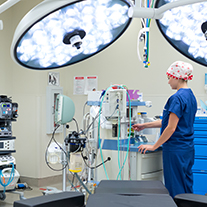
When you’re a patient at Iowa Ortho, your physician and care team work together to ensure you’re in the best possible condition for a safe and successful surgical experience.
Preparing for surgery can feel overwhelming. There’s often a long list of do’s and don’ts, and it’s easy to forget to ask, “Why are these steps necessary?”
In this article, we explain some of the most common preoperative instructions and why they are essential to your health, safety, and recovery.
Why You Shouldn’t Eat or Drink Before Surgery
It may feel strict—not even water—but there’s a critical reason for this instruction.
When you’re under general anesthesia, your body’s natural reflexes are temporarily stopped. If your stomach contains food or liquid, you risk aspiration, which means vomiting or regurgitating stomach contents into your throat or lungs.
Aspiration can lead to serious complications like:
- Choking
- Lung damage
- Pneumonia
- Brain injury
- Even death in extreme cases
By fasting for at least 8 hours before surgery, you significantly reduce this risk and help your care team keep your airway safe during the procedure.
Why You Need to Stop Taking NSAIDs and Blood Thinners
Before surgery, your surgeon may ask you to stop taking medications like:
- Aspirin
- Aleve
- Tylenol
- Ibuprofen
- Coumadin
- Other NSAIDs (Non-Steroidal Anti-Inflammatory Drugs)
Why?
These medications thin the blood and can increase the risk of excessive bleeding during surgery. Some, like NSAIDs, may also slow bone healing—a critical factor in orthopedic recovery.
If you’re on prescription blood thinners or take other medications regularly, it’s important to discuss them with your Iowa Ortho provider well ahead of your surgery date.
Why Chewing Gum or Mints Are Also Off-Limits
It may seem harmless, but chewing gum or sucking on mints increases saliva production and stomach fluid volume, which can:
- Alter stomach acidity
- Raise the risk of complications during anesthesia
Even these small actions can affect your surgical safety, so it’s best to avoid them entirely on the day of your procedure.
Should You Stop Taking Vitamins Before Surgery?
Yes—especially vitamin E.
Some vitamins and supplements can:
- Increase bleeding risk
- Interfere with blood clotting
- Negatively affect your body’s healing process
Always inform your orthopedic surgeon of any supplements you’re taking. They’ll provide guidance on what to stop and when.
Patient Safety Is Our Top Priority
At Iowa Ortho, we don’t set these pre-surgery instructions to be difficult—we do it to protect you. Following these guidelines helps your surgical team:
- Reduce risks
- Ensure a safe anesthesia experience
- Promote faster recovery
- Improve your overall outcome
If you ever have questions about pre-op preparation or medications, don’t hesitate to reach out.
Ready for Surgery? We’re Here to Support You Every Step of the Way.
Our team at Iowa Ortho is dedicated to providing safe, expert care before, during, and after your orthopedic procedure.
Call or text us at 515-247-8400 to speak with a member of our team.
